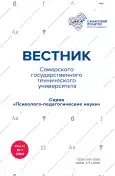Development of adaptive qualities of students in the course of boxing classes
- 作者: Sheyder A.D.1
-
隶属关系:
- Samara State Technical University
- 期: 卷 21, 编号 1 (2024)
- 页面: 77-86
- 栏目: Higher school education
- URL: https://bakhtiniada.ru/1991-8569/article/view/254164
- DOI: https://doi.org/10.17673/vsgtu-pps.2024.1.7
- ID: 254164
如何引用文章
全文:
详细
The paper considers the development of the student’s adaptive qualities by means of boxing with elements of problem-situational learning as qualities that positively affect adaptation to a new social space. The aim of this study is to experimentally check the influence of physical education by means of boxing with elements of problem-situational learning on the development of adaptive qualities of students in the educational space of a higher educational institution. An assessment of the emerging alarming situation was carried out with the help of a questionnaire specially adapted for this purpose «Hospital Anxiety and Depression Scale (HADS)» and «Psychical Stress Scales» (PSM-25) of Lemours – Tiesier – Phillon. The survey was conducted among students of Samara State Technical University (SamSTU), the first group of which attended elective boxing classes and the second group of students attended standard physical education classes. In the course of the study, the concept of adaptive qualities of a student was clarified, as well as the influence of physical education by means of boxing on the development of adaptive qualities of students in the educational environment of the university was established. Namely, an empirical study conducted among students of SamSTU showed that students attending elective boxing classes with elements of problem-situational training are more adapted to stressful situations, what plays an important role in the development of a future engineer personality.
作者简介
Aleksey Sheyder
Samara State Technical University
编辑信件的主要联系方式.
Email: sheider89@mail.ru
Associate Professor of Physical Culture and Sports Department
俄罗斯联邦, 244, Molodogvardeyskaya st., Samara, 443100参考
- Boronina L.N., Vishnevskiy Yu.R., Didkovskaya Ya.V. i dr. Adaptatsiya pervokursnikov: problemy i tendentsii [Adaptation of first-year students: problems and trends]. Ural’skiy gos. tekh. universitet, 2001. portal@ecsocman.edu.ru (accessed October 15, 2023).
- Braun T.P. Adaptatsiya studentov k obucheniyu v vuze v usloviyakh optimizatsii obrazovatel’noy sredy: Avtoref. dis. kand. ped. nauk [Adaptation of students to study at a university in terms of optimizing the educational environment: Abstract of thesis cand. of ped. sci.]. St. Petersburg, 2007. 179 p.
- Vinogradova A.A. Adaptatsiya studentov mladshikh kursov k obucheniyu v vuze v protsesse izucheniya matematicheskikh i estestvenno-nauchnykh distsiplin: dis. kand. ped. nauk [Adaptation of undergraduate students to study at a university in the process of studying mathematical and natural science disciplines: thesis cand. of ped. sci.]. Tyumen, 2008. 182 p.
- Muratova E.I., Fedorov I.V. Model’ adaptatsii studentov k professional’noy srede [Model of students’ adaptation to the professional environment]. Vyssheye obrazovaniye v Rossii. 2009. No. 6. Pp. 91–97.
- Osadchaya E.A. Adaptatsiya studentov razlichnykh psikhofiziologicheskikh grupp k uchebnomu protsessu [Adaptation of students of various psychophysiological groups to the educational process]. Obrazovaniye i obshchestvo. 2003. No. 2. Pp. 76–79.
- Harrison D. Universities told to adapt or die. www.theage.com.au/national/education/universities-told-to-adapt-or-die20111025-1mi05.html (accessed October 15, 2023).
- Dyson R., Renk K. Freshmen adaptation to university. University of Central Floride, Orlando, USA. www.ncbi.nlm.nih.gov (accessed October 21, 2023).
- Hoare S. Universities adapt to a shrinking world. The Guardian, Tuesday 7 March 2006. www.guardian.co.uk/education/2006/mar/07/elearning.technology14 (accessed October 22, 2023).
- Sheyder A.D., Denisova L.A., Beloshchenko D.V. i dr. Effekt Es’kova – Zinchenko v analize nervno-myshechnoy sistemy cheloveka [The Eskov – Zinchenko effect in the analysis of the human neuromuscular system]. Vestnik novykh meditsinskikh tekhnologiy. Elektronnoye izdaniye. 2017. No. 4. Publ. 1–3. http://www.medtsu.tula.ru/VNMT/Bulletin/E2017-4/1-3.pdf (accessed October 15, 2023).
- Zhuravleva I.V. Zdorov’ye studentov: sotsiologicheskiy analiz [Student health: sociological analysis]. Moscow: Institut sotsiologii RAN Publ., 2012. 252 p.
- Ushakova Ya.V. Zdorov’ye studentov i faktory ego formirovaniya [Health of students and factors of its formation]. Vestnik Nizhegorodskogo universiteta im. N.I. Lobachevskogo. 2007. No. 4. Рр. 197–202.
- Golubeva N.D., Klimova E.S. Nekotoryye aspekty issledovaniya sotsial’nogo prostranstva studenta [Some aspects of the study of the student’s social space]. Vestnik Samarskogo munitsipal’nogo instituta upravleniya. 2020. No. 1. Рр. 113–112.
- Rudneva T.I. Kommunikativnaya kompetentnost’: faktor gotovnosti k professional’nym riskam [Communicative competence: factor of readiness for professional risks]. Vestnik Tverskogo gosudarstvennogo universiteta. Seriya: Pedagogika i psikhologiya. 2016. No. 3. Рр. 76–84.
- Sheyder A.D., Igoshkin A.N., Berezhnik Yu.Yu. Formirovaniye sotsial’no znachimykh kachestv studentov tekhnicheskikh vuzov sredstvami boksa s elementami problemno-situativnogo obucheniya [Formation of socially significant qualities of students of technical universities by means of boxing with elements of problem-situational learning]. Uchenyye zapiski universiteta im. P.F. Lesgafta. 2023. No. 4 (218). Рр. 445–478.
- Ponomarev A.A., Tsinis A.V. Vliyaniye elektivnykh zanyatiy edinoborstvami na stressoustoychivost’ studentov SGMU [Influence of elective martial arts classes on the stress resistance of students of SSHMU]. Aktual’nyye voprosy sportivnoy psikhologii i pedagogiki. 2023. Vol. 3. No. 1. Рр. 41–49.
- Nikulicheva N.V. Podgotovka prepodavatelya dlya raboty v sisteme distantsionnogo obucheniya [Teacher training for work in the distance learning system]. Soderzhaniye, formy i metody obucheniya v vysshey shkole: Analiticheskiye obzory po osnovnym napravleniyam razvitiya vysshego obrazovaniya. Moscow: FIRO Publ., 2016. Vol. 4. 72 p.
- Polat E.S., Bukharkina M.Yu. Sovremennyye pedagogicheskiye i informatsionnyye tekhnologii v sisteme obrazovaniya [Modern pedagogical and information technologies in the education system]. Moscow: Academy Publ., 2010. 364 p.
- Izmaylov E.P., Golubeva N.D., Klimova E.S. Primeneniye adaptirovannoy ankety HADS dlya otsenki stepeni usvoyeniya uchebnogo materiala pri distantsionnom obuchenii [Application of the adapted HADS questionnaire to assess the degree of assimilation of educational material in distance learning]. Vestnik Samarskogo munitsipal’nogo instituta upravleniya. 2022. No. 1. Рр. 116–124.
- Vrazhnova M.N. Sistema professional’noy adaptatsii studentov tekhnicheskikh vuzov v usloviyakh vzaimodeystviya «vuz – predpriyatiye» [The system of professional adaptation of students of technical universities in the conditions of interaction «university – enterprise»]. Moscow: Techpoligraftsentr Publ., 2004. 179 p.
- Neyropsikhologicheskiye testy i shkaly. Sbornik [Neuropsychological tests and scales. Collection]. Moscow: Pero Publ., 2017. 78 p.
- Kharchenko M.A. Korrelyatsionnyy analiz: ucheb. posobiye [Correlation analysis: textbook]. Voronezh: VSU, 2008. 29 р.
补充文件









